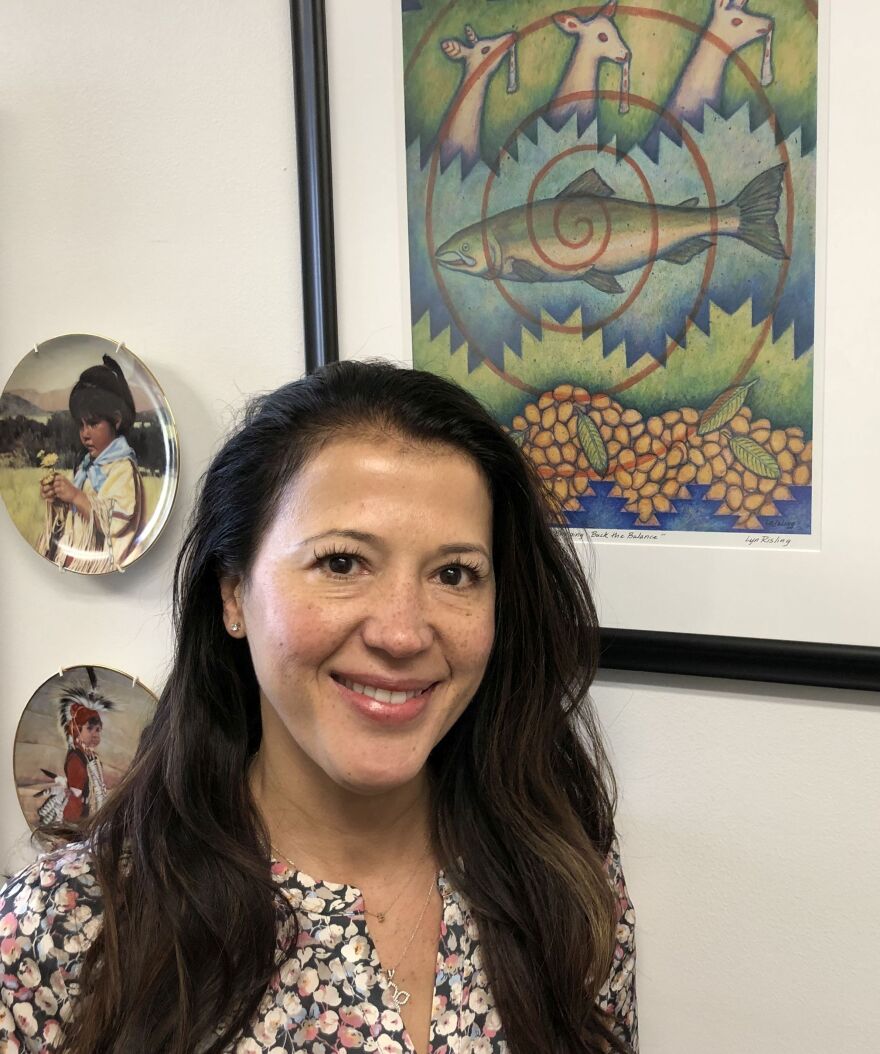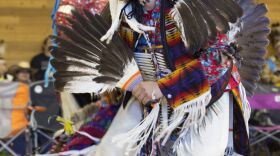Of the 317,000 veterans in Oregon, 3900 are Native American. Historically, the First Nations have enlisted at higher rates than any other demographic, despite not being recognized as U.S. citizens until 1924. As KLCC’s Brian Bull reports, native veterans in Oregon and across the nation are striving for more recognition and support.
“At this time ladies and gentlemen, we’ll go to the Warriors Society to give us a flag song…” says an emcee at last year's Siletz Pow-Wow. Because veterans hold a special status in Native American communities, they always lead the Grand Entry at these events.

“Please, remember all of our veterans who put their lives on the line, and lost their lives…in defense of our indigenous lands…" continues the emcee, as veterans appear with their eagle staffs and finery.
Indians have served the U.S. Army and other branches of the military, going back to the Revolutionary War. Many say it’s part of their “warrior code”, and proudly serve despite colonization and past conflicts with the U.S. government.

“My family feels that protecting this land is their land, protecting their way of life, irrespective of what the government has done to our people," says Terry Bentley. She's a Kurok tribal member, and Veterans Affairs Regional Specialist for the Western States including Oregon. She’s helped the VA develop programs for Native Americans.
“Like sweat lodge programs, talking circles, understanding what ‘smudging’ means, and helping sometimes bring in individuals from their native communities to work with them as part of their healing process.”
That’s especially true at Camp Chapparal, held for VA practitioners and vets every August. Hosted by the Yakama Nation in Washington State, Bentley says it’s nearing its 30th year. The week-long event was featured on the TV show, “The American Veteran.”
CLIP: “…the VA employees learn Native American patients must be handled differently, because injuries like PTSD hurt not only physically and mentally, but also spiritually.”

In an effort to improve services, the Oregon Governor’s Office and state VA are working to create a tribal veterans office for all nine federally-recognized tribes.
“The important part is that culturally, tribal veterans take care of tribal veterans," says Mitch Sparks, Deputy Director for the Oregon VA.
"And that’s been our goal, help them stand up and provide the training of their advocate to make sure they know and understand VA regulations, and help them be better advocates.”
Since last year, two tribal vet centers have been launched, with the Warm Springs and Umatilla Tribes. Sparks says the Confederated Tribes of the Grand Ronde are having his staff over for a consultation soon. Besides improving digital services and record keeping, Sparks says it helps tribes with legal matters.

“Tribal entities have a choice now…they can apply through the federal VA for their own power of attorney for their own tribe to represent their own veterans, or they can go through a state veteran’s agency like ourselves, to work under our power of attorney.
"And that’s a very recent change in federal law.”
And there are more federal efforts underway. This year, the U.S. Senate introduced a bill to improve VA outreach to native veterans. And a House resolution would officially recognize the Eagle Staff as the flag of the sovereign Indian nations…which pleases many elders.
"I’m an eagle staff carrier, I have a tremendous eagle staff, the feathers have been gifted by combat veterans,” says 83-year-old Bill Stam.
On the outskirts of Jefferson, Oregon, near the town cemetery, Stam presents his memorial started in 2013. The Oglala Lakota veteran served in Korea and Vietnam, and has funded this site with his own money and donations.

“This is the All-Nations Native American Memorial," he says, gesturing towards a life-size sculpture behind him. "A native on a horse, and he’s hunting buffalo. Last year we had almost 600 visitors, 32 states, and seven countries."
Stam is joined by his honor guard, a group of friends who are also native veterans. They’ve worked on a grassroots level to promote the memorial, which includes the names of Indian Codetalkers, and Congressional Gold Medal recipients.

“Can you untie this, Don?” asks Stam, of his fellow veteran, Donald Vanderburg Jr. His friend obliges, pulling back the plastic covering shielding the names from the rain.
“Mia Thom, she did 40 years in the military, she’s Vietnam, Desert Storm, Iraq, Afghanistan…" reads Stam.
Vanderburg Jr. is an Afghanistan veteran of Cherokee-Lakota descent. He says he’s done archery and ceremonial sweats here, which has helped his PTSD.
“I love it up here, this is my zen!" he laughs. "This is where I come up here to find peace."
“He’s changed a lot in a year,” adds Stam.
"Yeah, when I first joined up here with Bill, I was in not very good condition," continues Vanderburg. "I was in a lot of pain. And I come up here and started helping him, he started helping me, and as time went on, I got better.”

Another veteran is Ivan “Bud” Jones, of Cherokee-Lakota heritage and a VFW post commander. He says he wants Oregon lawmakers to show more support for the memorial, and native veterans in general.
“We need to get that message out. If we don’t share this history, it’s going to go away. And then it’ll be gone forever. And we can’t have that.”
As Jones and others work to highlight this memorial in Oregon, another one underway in Washington D.C. will also help share that history. In September, groundbreaking begins on the National Native American Veterans Memorial, with a dedication slated for November 2020.

Note: Funding for KLCC's "Borders, Migration, and Belonging" series is provided by the Wayne Morse Center for Law and Politics at the University of Oregon.
Copyright 2019, KLCC.





